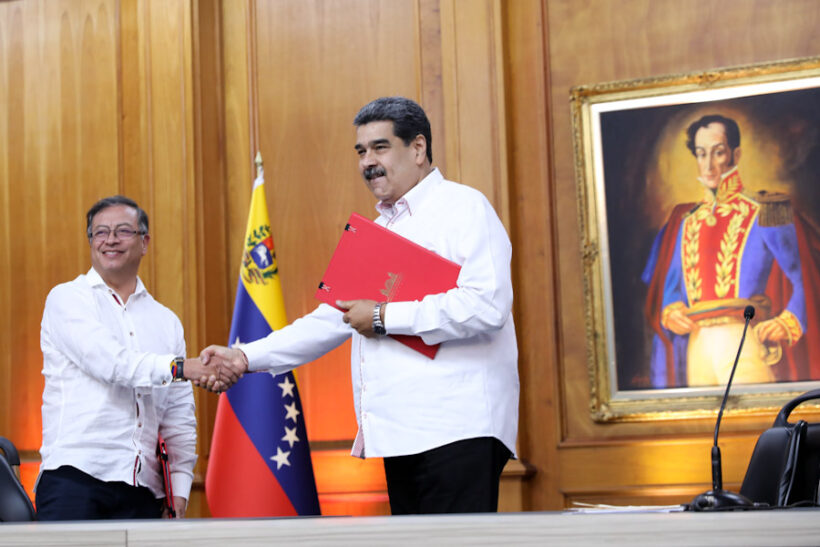The Miraflores Palace, the seat of government in Caracas, was the scene of a long-awaited meeting between Venezuelan President Nicolás Maduro and Colombian President Gustavo Petro.
By Marcos Salgado
In a two-hour private meeting, the presidents even agreed to re-establish coordination between the intelligence agencies of the two countries to attack the actions of armed gangs on the border.
According to Petro, this area is currently in the hands of mafias, and he agreed with Maduro that it must be “completely recovered”.
It was the first meeting between Venezuelan and Colombian leaders in six years. There are 1,400 kilometres between Caracas and Bogotá, which Petro flew over to meet his counterpart Nicolás Maduro and try to bridge the gap. “Separating two neighbouring nations is a suicidal adventure,” said Petro, shortly after shaking Maduro’s hand for the first time officially. For two neighbouring countries not to speak to each other is “unnatural”, Petro told the cameras at the end of the visit.
“Colombia and Venezuela, if there is one thing we have, it is a common destiny,” said Maduro, who stressed that relations between Caracas and Bogotá should always be marked by “brotherhood and understanding”. “We governments are obliged, in the diversity of our visions, to always work for the common good,” he added.
The separation “happened at a bad time”, quoted Petro, who is now trying to bridge the gap. During the lunch and meeting, the Colombian offered to mediate in the talks between the government and the opposition, a thorny issue, but one on which news is expected soon.
Maduro said they discussed trade and economic relations, and the “new steps” they will take “towards a total and assured opening of the borders between Colombia and Venezuela”, as well as “security and the proper and corresponding functioning” of the border area.
The summit, which was attended by senior officials from both countries, was key to what is to come, such as Venezuela’s return to the Andean Community of Nations (CAN) and the recovery of the border, which will be fully opened on 1 January, as well as the joint agreement on the defence of the Amazon at the COP27 to be held next week in Egypt.
Petro said that at the meeting they talked about internal problems to the most complex situations in the world: “It is anti-historical for Colombia and Venezuela to separate. It happened once, but it should not happen again because blood ties unite us,” the Colombian leader remarked. “We are going to live in a new phase that must generate true American integration in practice, in deeds,” he added.
We must link up with the people and be able to light up a new century to shout democracy and freedom, that is our invitation (…) Thank you for these hours and we will continue in these discussions, debates and meetings of a brotherhood that should never have been broken”: this is how Petro concluded his visit to Caracas, which according to his host, was “fruitful”, “auspicious” and “with good results”.
Tensions
Relations began to be strained during the government of Álvaro Uribe (2002-2010), with the departure of many Colombian companies and the nationalisation of others; Juan Manuel Santos (2010-2018) tried to restore them, but his public denunciations of irregularities in Maduro’s election in 2013 served to maintain mistrust in Caracas.
The last presidential meeting was in August 2016 between President Maduro, in his first term, and President Juan Manuel Santos. But more than an official visit, it was merely a work meeting to reach agreements on the complex common border, which never came to fruition.
Everything took a turn for the worse when Iván Duque arrived at the Casa de Nariño. Duque recognised opposition leader Juan Guaidó as “interim president” in 2019 and turned Colombia into the first detractor of the Maduro government and one of the headquarters of the radical Venezuelan opposition. Relations were severed and control tightened along a 2,219-kilometre border, where millions of people move. From Colombia came attempted break-ins, mercenaries, coup attempts and assassination attempts, according to a script written in Washington in the Trump administration.
Tensions continued to grow and several times came close to escalating into direct military action. The arrival of Petro to the presidency in Colombia marks the failure of this policy of conspiracy and confrontation.
Petro also said that this meeting must contribute to real regional integration, not just on paper. And he asked Maduro for Venezuela to return to the Inter-American human rights system and also to the Andean community of nations. According to Maduro, the latter has practically been agreed.
The arrival of Lula to the presidency in Brazil in January will give a new tone to relations between neighbours. There is even talk in Caracas of a meeting between the three of them, Lula, Petro and Maduro, next year.
Clearly, this is very good news for the continent and especially for beleaguered Venezuela. As President Petro said yesterday in Caracas, it is now necessary to ensure that this integration is not just on paper, and that it is a firewall against the United States’ attempts to regain control of the continent.
Marcos Salgado, Argentinian journalist from the founding team of Telesur. HispanTV correspondent in Venezuela, editor of Questiondigital.com. Analyst associated with the Latin American Centre for Strategic Analysis (CLAE, estrategia.la).










